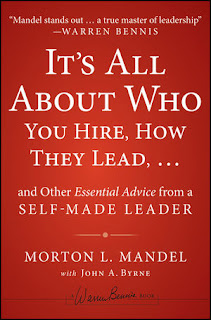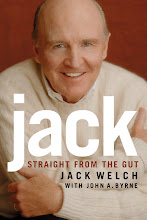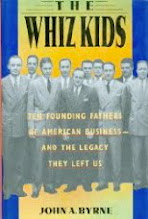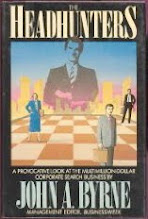Another year, another book? It certainly seems that way. This week, Jossey-Bass published by latest as part of its prestigious Warren Bennis series: my collaboration with Mort Mandel called It's All About Who You Hire, How They Lead...and Other Essential Advice from a Self-Made Leader. Now leadership books are a dime a dozen, but this one is special--and not because I was involved in its creation.
Over the course of
a long career in journalism, I’ve met and interviewed many of this generation’s
greatest corporate leaders: Jack Welch, Andy Grove, John Chambers, A.G. Lafley,
and Jeff Immelt, among countless others. Then, one day out of the blue, I
received a telephone call from a friend who asked me if I had ever heard of
Mort Mandel. I had to confess, I hadn’t. But the phone call led to a meeting
and then to numerous interviews and the book that came out this week.
Management sage
Peter Drucker once put Mort in the company of Andy Grove and Jack Welch. I
think he did Mort an injustice. Unlike a Jack Welch, an Andy Grove, or a Lee
Iaccoca, whose corporate achievements define their public personas, Mort has
lived in two worlds all of his years: the world of profit and the world of
social impact. Even as the chairman and CEO of a New York Stock Exchange
Company for 34 years, he was spending as much as a third of his time in the
social sector. Mort strongly believes that his experience in the social sector
made him a better corporate executive, just as he is convinced that what he
learned in business made him a more effective social capitalist.
It’s important to
note that Mort isn’t an executive who lends his name to the board of a
non-profit and shows up occasionally for a meeting or two. Rather, he has been
a true social entrepreneur, with his time and his money, founding, either alone
or with others, more than a dozen non-profit organizations, mostly serving the
general community. They’ve worked to improve the quality of professional
leadership in the social sector, to rehabilitate the inner cities, and to
revitalize Jewish education around the world.
What makes Mort
unusual, if not unique, is his selflessness in pursuing a life of purpose. From
his earliest days, he understood that there was much more to a successful life
than building wealth—though as a self-made billionaire his is a quintessential
rags-to-riches story. Mort understood that a life without meaning, purpose and
commitment isn’t a life at all. So he devoted a large share of his time to
combat human misery by bringing leadership to social causes.
As a writer,
helping Mort tell his remarkable story, it would have been easy for me to lapse
into a modern-day version of Horatio Alger. After a childhood spent in the most
humble of circumstances, Mort and his two older brothers scraped together $900
in 1940 and went into business as a distributor of auto parts. From a Cleveland
storefront on Euclid Avenue, the brothers build Premier Industrial Corp. into a
national company that by 1960 went public and in 1964 was listed on the New
York Stock Exchange. For 34 out of 36 years, under Mort’s leadership as CEO, and
making all major decisions jointly with his brothers, Jack and Joe, Premier
reported record earnings and became extremely profitable, selling what many would
consider fairly humdrum products—nuts and bolts, circuit breakers, chemicals,
lubricating oil, and fire-fighting equipment.















